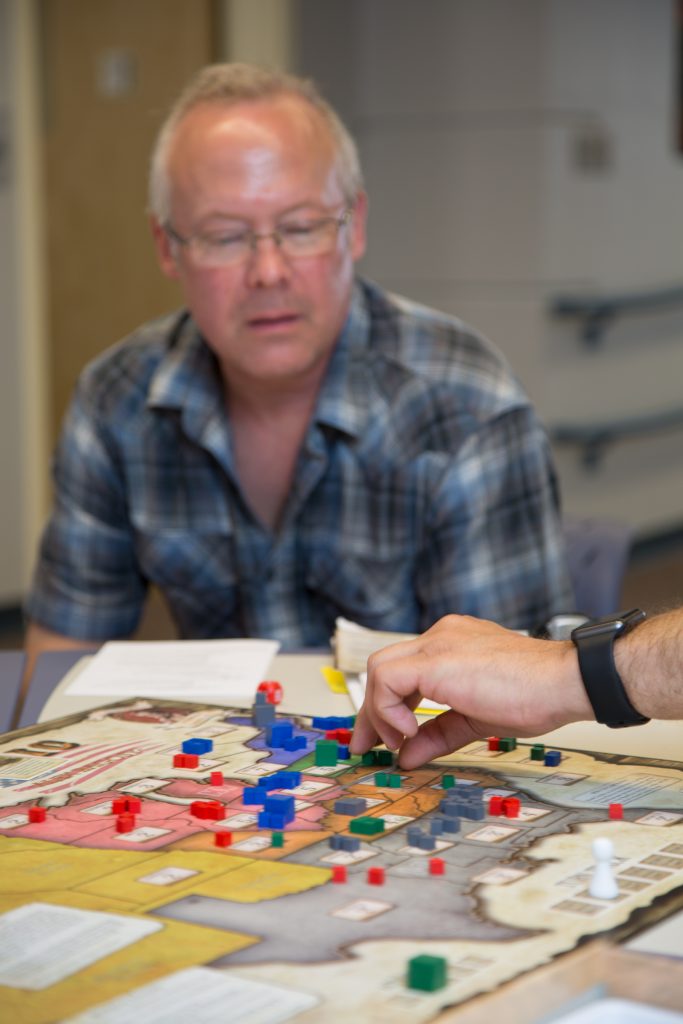No Longer a Trivial Pursuit: Using Games to Teach History
By Tom Porter
Can games teach history? This fall, a new, innovative course is investigating that question. In Historical Simulations (HIST 2624), sixteen upper-level students are examining American history, from the era of exploration through the Civil War, through the medium of tabletop games.
Modern board games have come a long way from the days of Monopoly and Risk, explained Professor of History Patrick Rael, a lifelong gamer who also devised the course. As they’ve become more complex, tabletop games have also taken on an ever wider array of topics, he said, many of them historical. “Popular games such as Ticket to Ride depict the history of railroad development, while games such as Carcassonne let players develop a medieval town. More complex games take on difficult topics such as the breakdown of the Roman Empire, European wars of religion, or the attempt to assassinate Hitler.”
Rael is leading his students in an investigation of these “serious games” and their capacity to teach, which, he said, raises a number of pertinent questions: “Can games constitute historical arguments? Are they, like historical feature films or computer games, manifestations of popular culture that promote common understandings of past events? If so, how do games impact the kinds of historical arguments they make?”
Students will explore six episodes in American history through the medium of games: exploration and colonization, the American Revolution, the framing of the Constitution, the expansion of the frontier, the fight against slavery, and the coming of the Civil War. For each theme, the class will play and study one game, putting it in conversation with historical scholarship and primary source documents on its subject.
Video: Watch Rael’s class play “Colonial: Europe’s Empires Overseas'”
Weekly “game labs” will offer students the opportunity for hands-on play. Each game will be played twice: once to simply learn its mechanics, and again to analyze its presentation of the past. Assignments will challenge students to enhance their game literacy by practicing game criticism. “In essence,” said Rael “I’m treating games as legitimate subjects of scholarly study, akin to literature and cinema.
“There’s certainly something distinct about the ways games make arguments,” he said. “As historical arguments they promote counter-factual thinking, for games are by design intended to let players’ choices yield different outcomes.” And the complex procedures serious games incorporate can themselves make critical statements, he added.
“Games are no longer trivial pursuits,” Rael argued. “Whether game designers are aware of it or not, their creations reinforce the way we view the past.” As examples, Rael pointed to controversies that have arisen over the representation in games of slavery and colonization, where his research interests lie.
Rael sees his effort as a necessary response to the multiplying media of the modern world. “Many scholars lament the decline of History as a profession,” he says. “But more history is being taught than ever before — through popular historical fiction, Hollywood films, video and computer games, and now tabletop games. It is important for students to appreciate how popular culture treats the past, so they can become more critical consumers of the History that surrounds them.”
At the same time, Rael said he wonders about the expressive potential of games. Once students become critical analyzers of games, he argues, they might go on to make more thoughtful games themselves. “Is it possible for games to make responsible arguments about the past, or about the difficult social issues that confront us in the present?”
He and his students intend to find out.



